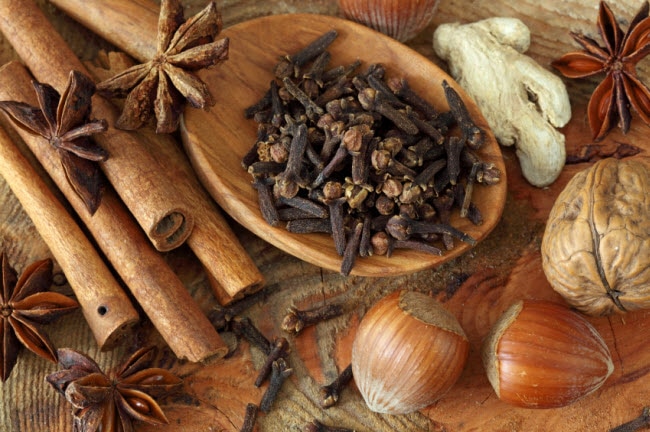
Herbs and spices have been used since the beginning of human history not only to improve the flavor of foods, but also for their beneficial effects on health. A traditional Indian curry, for example, is loaded with anti-inflammatory, anti-microbial, anti-oxidant, and gut-supportive spices.
Are any of these health-boosting spices present in our favorite Holiday foods? You bet!
Cinnamon, ginger, and clove are just a few of the many warming spices added to drinks, pies, and other Holiday favorites.
Cinnamon comes from the inner bark of the Cinnamomum tree and is loaded with polyphenol antioxidants, making it a valuable anti-inflammatory. It can support balanced cholesterol and blood sugar levels, stop the growth of bacteria and fungi, and may even help protect the brain from neurodegenerative disease (shown with Parkinson’s in a mice study). It can also be used to reduce insulin resistance.
Ginger, one of my personal favorites, is a potent anti-inflammatory and circulatory stimulant, meaning it improves blood flow, especially to the GI tract. That’s why we think of ginger for nausea, indigestion, and morning sickness. Like cinnamon, it also lowers blood sugar and supports cardiovascular health. One lesser known use for ginger is menstrual pain, comparable to 400 mg of ibuprofen at just 250 mg of ginger powder.
Clove is another spice quite high in antioxidants, and it is a strong antimicrobial, helping the body to ward off bacteria and parasites. It has demonstrated anticancer effects in test-tube research, and has improved liver function in animal studies. Too much clove can be toxic to the liver, though, so best keep amounts to just enough to get the spicy, earthy flavor needed to really bring that pie to life.
All three of these spices are called “carminatives” in the herbal world – carminatives help relieve gastrointestinal cramps, relieve bloating, and promote healthy bowel movements. These make them great friends to have in a season where we tend to eat a bit more than we would at other times of the year!
